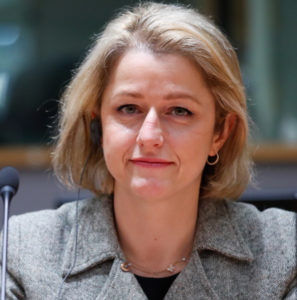
Barbara Pompili underline her desire to reconcile climate ambition and social ambition, in order to ensure a just transition for all citizens, businesses and territories of the Union.
Barbara Pompili highlight the increasingly fundamental role of forests in achieving our climate and environmental goals.
“The European Union is continuing its very strong mobilization to fight climate change. The climate COP and the review of EU climate and environmental legislation pave the way for carbon neutrality. Failure is not an option. ”
During COP 26 Barbara Pompili recalls that the risk of leading to less ambitious decisions exists. Questions still remain on the question of adaptation. Developing countries are waiting for rich countries to provide them with financial assistance to combat the effects of global warming.
“Developed countries do not take sufficient account of the situation in emerging countries,” lamented Milagros de Camps, Deputy Minister of the Environment of the Dominican Republic. The nations most affected now estimate their adaptation needs at 1.3 trillion dollars. On this point, Barbara Pompili considers that the initial 100 billion should already be released before considering increasing the envelope. For the minister, it is only in this capacity that it will be possible to “restore confidence”.
In general, the Minister of Ecology wants to reconcile goodwill and patience. To reduce greenhouse gas (GHG) emissions, Barbara Pompili prefers progressivity to radicalism. “The transition has to be fair,” she explains. Then, the minister brings up the case of South Africa and Poland. “These territories are heavily impregnated with coal. If transiently they need a little gas, it is not as bad as coal “, considers Barbara Pompili. For her, integrating “additional natural gas into the taxonomy is not a problem. In some countries, it will be impossible to have a rapid drop in GHG emissions without back-up gas “.
This pro-gas stance earned France the designation “Fossil of the day” by the Climate Action Network. The association denounces the pressure exerted on Brussels to include gas and nuclear power in European taxonomy. In fact, Barbara Pompili is once again in favor of nuclear power, “the least emitting source of energy”. She indicate that between “the decision, the construction and the commissioning of a nuclear power plant, it takes ten to fifteen years”. Thus, the construction of new nuclear power plants could, according to her, be relevant in a low-carbon mix in the long term.
The Minister for the Ecological Transition also discusses the challenges facing the French. “Some people have to make their carbon transition; we have to make our automotive transition. » France is one of the countries that are committed to reducing 30% of their methane emissions by 2030. “John Kerry said this reduction is like getting rid of all the planes, boats and cars that are in the world today. This is not nothing “, attests the Minister of Ecology. The Minister of Ecology Transition is convinced that “to be responsible, you have to stay the course. We must not make overly ambitious decisions that encounter blockages on the ground”.
Last December, The Minister of Ecological Transition made the trip to “Chantiers de l’Atlantique” to discover Solid Sail and an electrical substation. Greener sailing ships at the heart of a high-tech industry.
The “Chantiers” are reinventing themselves, looking to the future by going back to their roots, with sail propulsion, noted Barbara Pompili. It shows how we can reindustrialize our country if we all do it.
Minister Barbara Pompili wants to go further. The idea is to see how we can use the credits from “France 2030” so that they are oriented, she said.
Barbara Pompili mentione the possibility of opening “new mines” in metropolitan France.
Prospecting in mainland France? “We should not prohibit ourselves from doing so”, Barbara Pompili defends herself. Since the industry can no longer do without this “critical” metal for making batteries, why not “look at what we have here”? And exploit this resource, rather than importing it massively. “We could have mines that are much more respectful of the environment,” argues Barbara Pompili, rather than “letting them pollute elsewhere while carefully closing our eyes.
France produces almost no lithium but consumes more than 15,000 tonnes per year. By 2025, production needs will have almost quadrupled on a global scale, according to Fast markets. There is therefore an urgent need, as the Minister explains, to secure the supply of this critical resource.
“Aware of the concerns of the population and the reaction of elected representatives to deep geothermal energy”, the Ministry of Ecological Transition has commissioned the National Institute of Industrial Environment and Risks (Ineris) and the National Geological Survey (BRGM) to “improve the consideration of natural phenomena associated with the research and exploitation of geothermal deposits”, it is up to the minister to prove that geothermal energy does not present any risks.

















